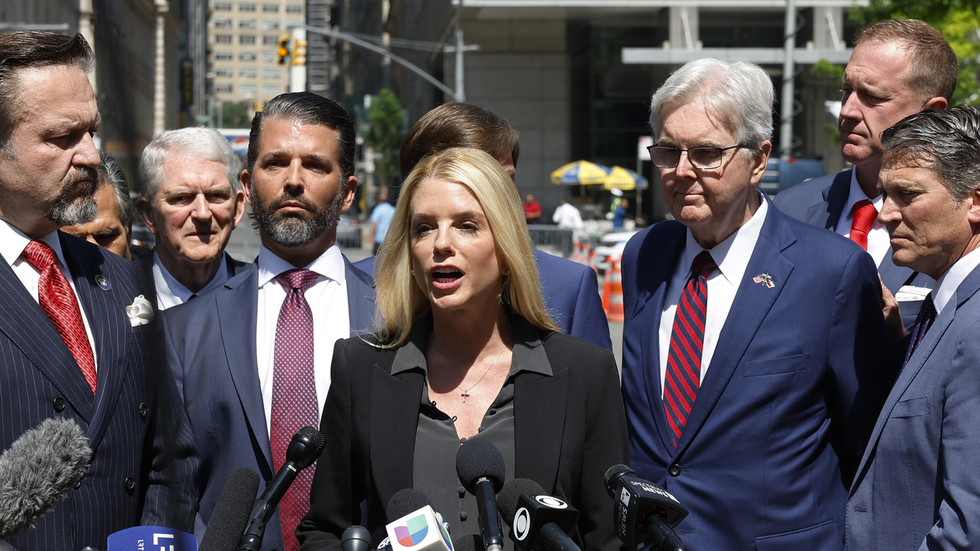Google 'rigged the rules' of online display advertising for years and must be held 'accountable,' lawyers for the U.S. Department of Justice told a court.
The tech giant was accused of operating a 'rapacious' monopoly and being an 'authoritarian intermediary' as it controls how publishers and advertisers interact.
DOJ lawyers set out their case in closing arguments on Monday following a three-week antitrust trial that took place in September.
The case centers on the billions of adverts that are bought and sold daily on web pages, including those of news publishers.
Sales are 'programmatic,' meaning automated auctions taking milliseconds are held.
Google owns the biggest ad server, the technology tool used by publishers to sell the space on their sites, which is known as DFP.
It also runs the main tool used by advertisers to buy the space, called Google Ads.
And it has the largest exchange where the instantaneous auctions take place, which is called AdX.
Fees for the three technology tools mean Google keeps over 30 cents of every advertising dollar that goes through them.
The case is being heard by Judge Leonie Brinkema in Alexandria, Virginia, just outside Washington D.C.
Aaron Teitelbaum, for the DOJ, told the court: 'For more than a decade Google has rigged the rules of the road, restricting customers' freedom of choice, and extinguishing better ad tech products through acquisitions. Google is once, twice, three times a monopoly.'
Google 's alleged monopoly of online display advertising is negatively impacting the ability of news organizations to invest in journalism, a senior publishing executive told the trial
He added: 'As a result, Google's customers have no realistic alternatives to doing business with Google.
'Google didn't achieve this trifecta of monopolies by accident.'
Mr Teitelbaum said Google had been 'saddling customers with product features they don't want' and publishers were 'stuck using DFP - they can't go anywhere else.'
He said: 'Google is saying to its customers "Google knows best". But that's not correct. Competition knows best, freedom of choice knows best.
'We are here to hold Google accountable for its rapacious, anti-competitive conduct over a decade. The result has been less innovation, less consumer choice, and higher prices in these markets."
He urged to judge to 'hold Google accountable for the harm it has caused.'
Google CEO Sundar Pichai who was not present at court
Julia Wood, also for the DOJ, added that the trial reminded her of Charles Dickens' 'A Tale of Two Cities'.
'Is it the best of times or the wort of times?' she said. 'You were told one tale by publishers, who were not paid to be here.'
A different tale was told by witnesses who were 'receiving money from Google,' she said.
Google had been acting as an 'authoritarian intermediary' in online advertising and 'the facts of this case are overwhelming,' she added.
Karen Dunn, for Google, told the court: 'The law simply does not support what the plaintiffs are arguing in this case.'
She said the tech giant had 'grown the pie for everyone' and that 'Google’s conduct is a story of innovation in response to competitive forces.'
Ms Dunn argued that the DOJ 'gerrymandered' a narrow market of 'open web display advertising' for the court to consider.
Google legal team members wait outside the courthouse
Google was part of a broader advertising market where it was facing competition from Microsoft, Facebook, Amazon and others, she said.
When that broader market was considered Google's share of digital advertising was going down, she added.
She said advertisers were also moving away from display adverts on websites to social media, and the growth of advertising on TikTok had been 'astronomical.'
She added: 'There are millions of publishers who are integrated into the Google ecosystem. The court never heard from the publishers who are happy with what they are getting.
'The antitrust laws do not say you have to share your technology on terms that other people want.'
During closing arguments Judge Brinkema noted as 'very significant' evidence heard in the trial that Google had a policy of automatically deleting employees' chat records after 24 hours.
The U.S. District Court for the Eastern District of Virginia
She will now decide if Google has a monopoly on display advertising.
If so, she would then consider prosecutors' request to make Google at least sell off its publisher ad server and ad exchange.
The judge has said she will deliver her opinion swiftly, as early as next month.
Whatever the outcome it will almost certainly be appealed, prolonging a process that could go all the way to the U.S. Supreme Court.

 By Daily Mail (U.S.) | Created at 2024-11-26 14:04:21 | Updated at 2024-11-28 00:48:45
1 day ago
By Daily Mail (U.S.) | Created at 2024-11-26 14:04:21 | Updated at 2024-11-28 00:48:45
1 day ago








